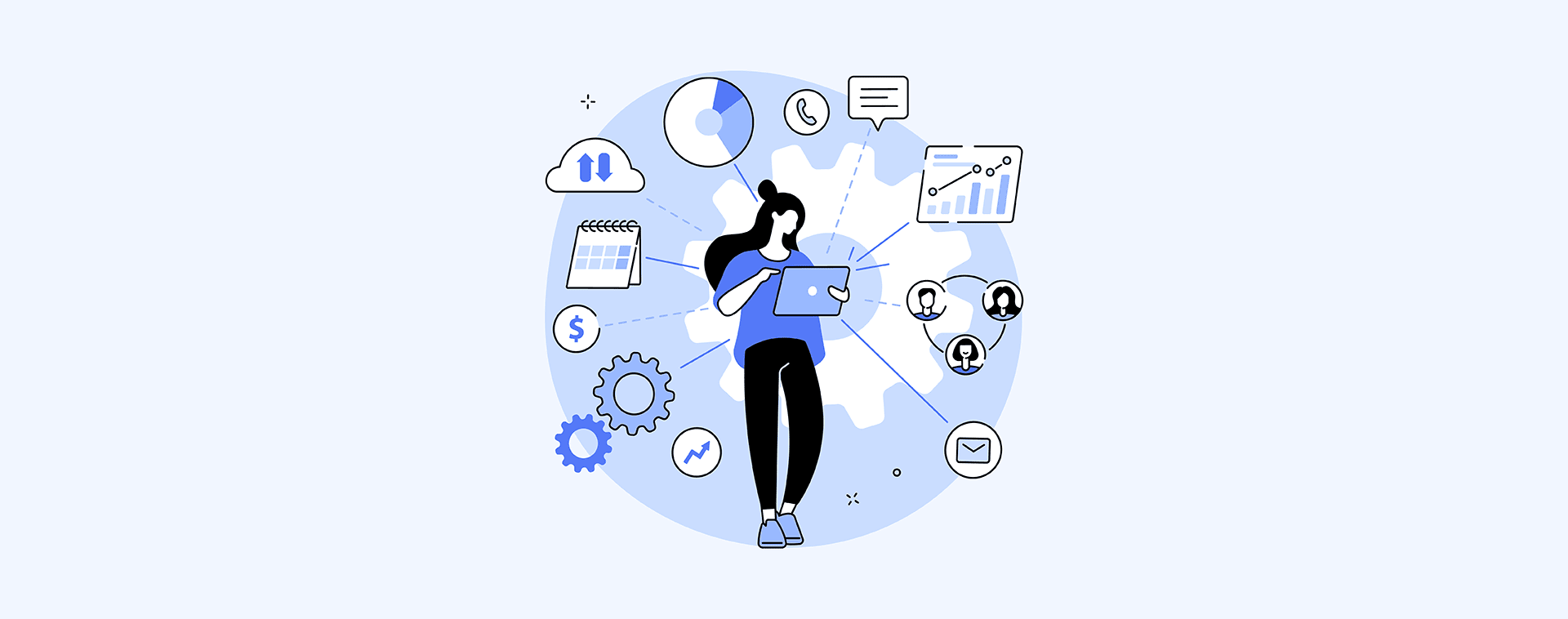When people hear ‘bespoke software’ the normal reaction is concern over what that will cost. In this article, we consider where bespoke software may be cost-effective and appropriate.
So, what do we actually mean when we talk about a software system? In relation to a website, this means part of a website created to make a process on the site effective, efficient and smooth for the user.
Although there are off-the-shelf online software options that can work well in many cases, and offer the advantages of quick implementation and lower cost, these options generally only offer some of the capabilities that are wanted, and they may not support all the workflows and processes you use. This means a business may have to be change or modify its own processes in order to make effective use of the software.
This is where bespoke software can come into its own. It can be designed specifically around the needs of the business and the way it works. It can be adapted in the course of development, allowing a customer to specify changes once they have tested how the software works. The user interface can also be customised to suit the business – going beyond the insertion of your logo to a look and feel that fits into your brand.
Although bespoke can be the best option in terms of getting exactly what you require, it is often more expensive.
It is worth weighing up the cost investment against how usable the software will be, and how transformative it could be to the business. Easy-to-use software that fits the processes and workflows of a company closely can have a huge positive impact - on efficiency, on reporting, and ultimately on the success or failure of a business. The more core the software is to the smooth running and operation of the business, the greater the overall benefit it can provide.
Investment in a bespoke software system can have a number of benefits. It can reduce the amount of person-hours needed in day-to-day operations, such as logging and tracking work projects or leads. It can speed up what staff need to achieve when they use the system, freeing up those staff to work on other things. It can even reduce the number of staff that are needed on administrative tasks to achieve the same outputs, benefiting the bottom line.
It can even enable improvement in sales, conversions, subscriptions and overall business profitability, by helping to ensure leads are followed up and prospects are converted to clients, and that existing clients are kept happy, reducing ‘churn’ (the loss of old clients and the need to replace them with new clients).
In this article, we look at the various different types of software systems and how they can be used.

1. Bespoke company or organisation intranet
Bespoke company intranet systems come into their own when servicing a larger business or organisation. They can be beneficial for companies with a 5 or 10 employees upwards, especially if there is a departmental structure or the staff are working in different locations. It allows them to check for actions that need taking and items of work that need doing on a centralised system, where each employee has their own log-in and a tailored area listing their activities and deadlines and any updates that they need to be aware of etc.
This type of system can be used for holding online staff discussions, storing and distributing staff documents and handbooks, and registering staff holiday bookings, for example. Options available from the system could include ways in which staff can confirm that they have completed certain tasks, such as reading important new policies and documents and ensuring that they stay up to date with the latest training courses. The system could also feature a news section, which can be regularly updated with internal company news to raise awareness of company activities and important company news, as well as helping to make sure remote workers are not in the dark about what is taking place.
A log-in system can also be used to offer remote access to specific documents and files to those with the right permissions to view them, so that they are available only to authorised directors and employees. For example, a company folder holding HR memoranda might only be suited to viewing by directors and officials with HR responsibilities.
As well as providing a useful communications solution in professional settings, an intranet system can also be used in educational settings, e.g. a school where teachers and parents can have log-ins. This offers a convenient way for teachers and parents to stay in touch throughout the school year, and can aid in raising awareness of school events.
Not only does an Intranet system act as a central hub for an organisation, but also it can encourage a sense of community among employees and users, helping them all to feel valued and engaged rather than alienated.

2. Bespoke time management system
For companies and businesses that are continually working to deadlines, and on client projects where tasks need to be allocated against the correct amount of time, a bespoke time management system could be the answer. Options that could be featured here include project activity logging, time logging and forecasting, and client invoicing functionality. This can help make future cost planning easier, as well as enabling staff to log their time against specific tasks and clients so that work done is properly invoiced and time is accounted for properly.
A system such as this can be important for companies that work directly with clients on a retainer basis, providing them with a certain number of billable hours of work on a weekly, monthly or quarterly basis. Requiring staff to keep a record of exactly what they have been working on and how they are using those company hours ensures transparency in the allocation of the client’s retainer budget. This information also then acts as a record for future reference if any questions come up.
Having staff keep a record of their client hours will also help them stay on track with projects and enable better, more efficient management of time. In retrospect, time records can also clearly show how much time each type of task typically takes. This in turn will allow for better future planning and more accurate quotations for client projects.

3. Bespoke delivery management system
Businesses that sell physical products need a reliable way of being able to fulfil orders for customers – getting the right items to the right address, and ensuring that any deliveries are made at an appropriate time with the customer notified to ensure they are available to take delivery.
Using a bespoke delivery management system may be an option for such businesses when off-the-shelf options are not appropriate. This type of system can show warehouse stock levels, allow stock to be allocated to specific delivery vans and routes, and can track delivery journeys in real time in order to give visibility to the customer of where products out for delivery are at all times, and a time window when final delivery is expected. This will help manage customer expectations; if their delivery is delayed, they can be contacted and provided with a date and time window for re-delivery.
With so many competing delivery options available, customers have come to expect a certain level of service and communication regarding the status and anticipated delivery time of purchases. Having a smooth system of operations monitoring in place helps reduce any delivery delays resulting from low stock levels or limited availability at certain locations, leading to an increase in efficiency and customer satisfaction and a reduction in business costs. There should be fewer customer service calls or complaints to deal with as a result.

4. Bespoke customer log-in area on website
Bespoke log-in areas can be useful for businesses that can give the option for customers to create an account or become a ‘member’.
Member accounts are online accounts created either at the customer’s instigation or on the customer’s behalf, allowing access to content that may be restricted or tailored to that person – as well as a self-service area to update their details without needing to phone or email.
Alongside the customer’s basic contact details and delivery and billing addresses, they may be able to save their preferences, such as for example preferred means of contact and preferred means of payment, all of which the customer can access quickly on logging back into their account on the site.
Additionally, they may be able to re-order previous orders with a single click, or access virtual ‘shopping baskets’ that have been abandoned before checkout or stored in a ‘Saved for later’ area. They can also give the option of adding certain products to wish lists or ‘favourites’ lists while browsing, when someone is not ready to order yet but is considering doing so in the future, so that the items of interest are easy to find again at a later date and revisit with a view to purchasing them. All of these facilities can be valuable to online retailers making the site more frictionless, encouraging return custom.
In a more professional setting, such as a hairdressing salon, a hypnotherapy practice, a counselling service, or a tuition service, a log-in system could be used to allow clients to remotely access specific documents and files so that they are always available when wanted, such as records of their past appointments and services rendered, and confidential notes and remarks. It could also be used for online appointment bookings.
Such systems can be customised according to the exact needs of the organisation and its clients. The options can be chosen based on what type of organisation the system is for, and what facilities will be most helpful to its customers or users. A more personalised experience is likely to encourage the customer to return, so investing in a tailored customer log-in area designed with your own business offerings in mind, rather than a generic option, can pay off in the long run.

5. Bespoke B2B features for E-commerce websites
For e-commerce businesses that mainly serve other businesses – whether trade or vertical markets - bespoke features aimed at the needs of their target business clients can be very helpful. These may involve a complex procurement system, offering advanced options to every business registering a profile, or integrating with online marketplaces or systems which customers are using to make it more convenient for them to access those products.
Examples of what this type of software can offer include flexible per-customer pricing based on products supplied under contract, whereby specific prices or discount levels are available on selected lines but only to certain customers.
It could also be set up to allow business customers to specify monthly budget limits and block them from exceeding these when ordering (or, alternatively, to require approval from an authorising manager) in order to control spend levels. The best way to set up and configure an approvals process tends to vary depending on the type of business, its internal budget control process, and even the market it supplies.
Many of the features would be aimed at making the user journey as easy and as fluid as possible where customers need to carry out certain actions on the site. The requirements of B2B customers tend to be somewhat different from retail customers, which is why B2B ecommerce websites tend to offer a different set of features.
All business clients value efficiency in their operations, which includes the purchasing process and how that integrates with their own procurement systems. Helping them achieve this when they want to buy what you sell can be hugely beneficial in acquiring them and keeping them as long-term customers.

6. Online payment systems
Many of the types of software we have discussed already work best as bespoke, made-to-order systems that exactly match requirements - though in some cases it will be cheaper to use an off-the-shelf system.
There are other types that can be useful to a number of businesses without the need for customisation. All e-commerce sites will need some sort of online payments system in order for customers to purchase items quickly and easily - without the burden of payment processing falling on telephone sales staff or manually checking for electronic payment transfers after an order is submitted.
It is not only sites selling physical products that can make good use of an online payment system: vendors of courses, lectures, electronically delivered concert tickets, parking tickets, consultancy appointments and many other services can also use systems like this to enable online payments.
More service businesses are using online payment systems to allow customers to book in and pre-pay for servicing of home heating systems, for example, when previously the payment would have had to be taken over the phone.
This reduces friction and speeds up the process for customers (many of whom will now expect to be able to make payments online), and also means that the time burden on staff who would otherwise be needed to handle telephone calls and take card numbers for payment is greatly reduced.
Conclusion
We can see that there are various bespoke software systems available that are able to carry out all manner of tasks. Which is best suited to your business will depend entirely on what type of business you have and what you hope to achieve. In all cases, it is probable that something bespoke will require a fairly sizable initial investment, but what is also highly likely is that this investment will pay off in the long run in terms of increasing business efficiency, reducing staff hours and keeping customers satisfied.
What kind of software system would benefit your business? If you have an idea or something in mind that you would like to discuss, please get in touch with the team today. We’re always happy to chat about bespoke projects and how we can help your business.
